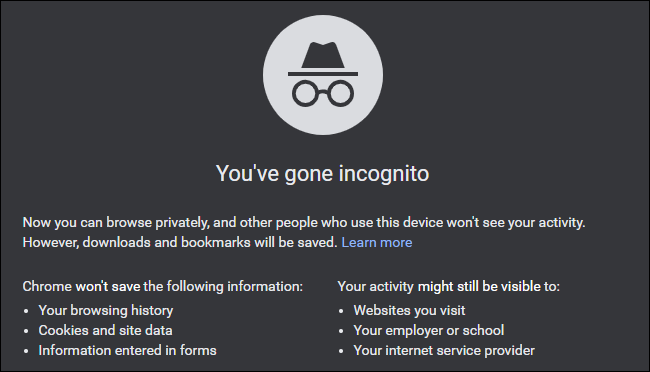
Does Private or Incognito Mode Make Web Browsing Anonymous?

Private is a relative term. This is abundantly clear when it comes to “private browsing”—the setting in a web browser that supposedly allows you to hide your history from others who use the same computer.
While private (or “incognito”) mode can shroud your activities to an extent, there are still ways in which your actions can be tracked. And not just by people on your network, but also by your ISP, the government, and even hackers.
What Is Private Browsing Mode?
Before we get to the meat of things, let’s first define what we mean by “private” or “incognito” mode. This feature first appeared in Apple’s Safari browser in 2005. It didn’t take long for rival browser vendors, like Google and Mozilla, to follow suit. Soon, it became a standard component for any web browser worth its salt.
Private browsing effectively creates a separate browsing session that’s isolated from the main one. Any sites you visit aren’t recorded in your device’s history. If you log in to a website in private mode, the cookie isn’t saved when you close the window.
It’s worth mentioning that this principle cuts both ways, however. Private browsing tabs can’t access cookies you use in the main session. For example, if you log in to Facebook, and then enter incognito mode, you’ll have to log in again.
This makes it slightly more difficult for third-party sites to track your activity while in incognito mode. It also allows you to easily access multiple web accounts concurrently.
As a bonus, it also becomes easier to skirt around so-called “soft paywalls”—websites on which you’re granted access to a few pages before being prompted to log in or subscribe.
The Limits of Incognito Mode
Browsers that offer a private mode often take great pains to emphasize it isn’t a catch-all protection. At best, it provides a thin layer of privacy for people working from their private home networks.
Incognito mode doesn’t stop the administrators of corporate or educational networks from keeping tabs on your activity. It also doesn’t necessarily prevent someone from spying on your browsing habits if you’re using a public hotspot in a cafe or restaurant.
Again, private browsing exclusively concerns itself with how browsing activity data is stored on your personal device, not its transmission across a network.
Furthermore, there are ways in which private browsing can be defeated locally. If your computer is infected with malware that tracks network traffic and DNS requests, incognito mode can’t help you. It also can’t beat “fingerprinting” techniques, in which third parties (usually advertising networks) attempt to determine distinguishing features of your computer to track its activity across a network.
Fingerprinting is an interesting phenomenon. It seems to attract less attention than malware and trojans, despite its ability to pinpoint individuals with startling accuracy. As you browse the internet, third-party sites can glean information about your computer, including your time zone, the display resolution, the browser, plugins, and language you use, and so on.
Any of this information might be insignificant by itself, but together, it forms part of your device’s semi-unique profile. Research from the Electronic Frontier Foundation shows that only one in 286,777 browsers share the same precise configuration (or “fingerprint”).
The EFF offers a service called Panopticlick, which can show your browser’s uniqueness score. This site illustrates the unfortunate reality that our computer configurations are less unique than we once thought, making it easy for third-parties to track us.
RELATED: How Does 3D Printing Work?
Is Online Privacy Even Realistic?
What electronic “privacy” actually means, and whether it’s even a realistic prospect on the internet are important topics to explore.
In the simplest of terms, internet privacy indicates the ability to communicate and browse without an external third-party being able to observe our activities. Currently, we face an abundance of potential barriers to this.
What about those who operate your network, and your ISP? And don’t forget about your government. There’s also the ad tech industry, which delivers precision-targeted advertisements through sophisticated tracking systems, including the fingerprinting approach we mentioned earlier.
The Internet is a panopticon. Yes, the VPN industry promises to deliver privacy if you invest in its products, but there’s no silver bullet. True privacy seems illusory. The best you can hope for is something approaching that lofty standard. To get there, you’ll also, inevitably, have to invest time and money and be prepared to suffer a degraded browsing experience.
Want to stop your network admin from seeing what you’re up to? Well, you’ll need a VPN—and make sure it’s one that doesn’t keep logs. But what about trackers? You’ll need a plugin for those. To be really safe, disable JavaScript entirely. Sure, it’ll stop many sites from working correctly, but it’ll also stop those nasty fingerprinting scripts.
Those are extreme measures, and not something we’d recommend, for obvious reasons. Nevertheless, they illustrate the fact that internet privacy isn’t black-and-white. Rather, it’s a spectrum of shades.








Leave a reply